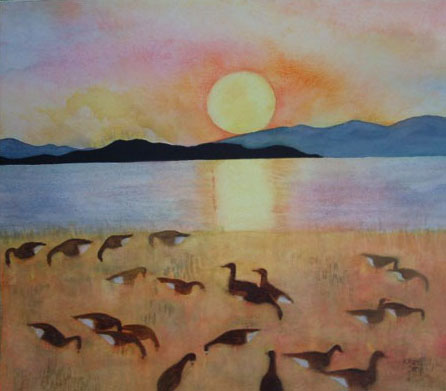
 |
Kintyre sunset with geese |
|
Kathryn lives on the
beautiful Atlantic seaboard of
Kintyre. To the west, over the Sound of Gigha, are the
isles of Gigha, Islay and Jura. In winter the area is home to a
protected species of migratory geese, the Greenland
Whitefronts.
Kathryn writes:
There was a proposal to build a wind farm at Largie on
the coastal hills, beween the protected feeding grounds of the geese on
the coast and their protected roosting lochs in the hills. The
site would have been close to houses, and to tourist and ferry
routes. The seven giant turbines [each 110 metres high] would
have dominated the gentle, low-lying hills along this spectacular
coast. Previous wind farm developments had, appropriately, been
restricted to the hills on the central spine of Kintyre, but this
development, land-owner and developer-driven, would have set a
precedent for the industrialisation of the scenic west coast.
A campaign initiated by www.ArgyllWindfarms.com
(
www.StopLargieWindFarm.com
) to stop the wind farm going ahead mustered 1000 signatures from
all over the world, but a local petition in
support of the wind farm also
mustered 1000 signatures. Local people signed the petition in the
belief that the wind farm would bring jobs
[construction] and prosperity [handouts from the wind farm
developers] to the local area, at a time when a local wind turbine
factory, Vestas Celtic, was under threat of closure.
The local councillors, who are totally committed to the
'development' of this unspoiled rural peninsula, were forced
to refuse the application, on 7 March 2007, only because they
would be breaking the law if they passed it. [It is illegal
to threaten the integrity of a site protected by European Law].
Our beautiful, unspoiled coastline was only saved by the geese.
The councillors voted unanimously to reject 'visual
considerations' and made it known that they were not happy
about 'being dictated to by Brussels', that this was 'the end of
democracy and local decision-making' and that if it had been up to
them, they would have passed it unanimously. Their decision to
ignore landscape considerations and the advice of their own planners
and Scottish Natural Heritage leaves an 'open door' for future
wind farm applications in the area. Even at this stage, the Largie
developer has the right to appeal to the Scottish Executive, and in the
frenzied Rush for Renewables, who knows if the Members of the Scottish
Parliament will uphold the councillors' [reluctant] refusal. We
may well have won the battle, but I fear that we have lost the war.
We desperately need a Government which will not
subsidise wind farm development to the exclusion of other forms of
renewable energy. We need a Government which will
support windfarm development only in appropriate sites and will insist
that local planning committees take account of Local Development Plans
and Policies and National Guideliness on Wind Farm Development, and
also take the advice from the government's advisors on landscape and
wildlife issues, Scottish Natural Heritage.
|